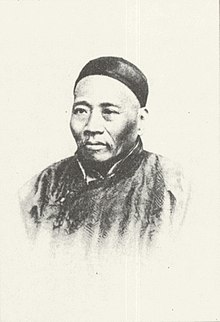Wang Tao (19th century)
| Wang Tao | |
|---|---|
 |
|
| Writer & Publisher | |
| Born |
November 10, 1828 Puli Town, Wuzhong District, China |
| Died | April 1897 (aged 68–69) Shanghai |
| Names | |
| Traditional Chinese | 王韜 |
| Simplified Chinese | 王韬 |
| Pinyin | Wáng Tāo |
| Wade–Giles | Wang2 T'ao1 |
Wang Tao (Chinese: 王韜; November 10, 1828 – April 1897) was a Qing dynasty translator, reformer, political columnist, newspaper publisher, and fiction writer. He was born as Wang Libin in Puli Town in Suzhou prefecture.
In 1848, Wang Tao went to Shanghai to visit his father. During his stay in Shanghai, Wang Tao visited the London Missionary Society Press. He was warmly greeted by Walter Henry Medhurst and his daughters Mary and Ellen. Wang Tao also met missionaries William Muirhead, , and William Charles Milne, all well versed in spoken and written Chinese language.
In 1849 Wang Tao's father died. Wang Tao was looking for a job to support his family. He was offered a job by Walter Henry Medhurst at the London Missionary Society Press in Shanghai assisting in his translation of the New Testament into Chinese. Wang Tao worked at the London Missionary Society Press for the next 13 years. In this period, he also translated many English books into Chinese in collaboration with missionaries Alexander Wylie and Joseph Edkins. These included Pictorial Optics, An Elementary Introduction to Mechanics, Concise History of Sino-British Trade, and A History of Astronomy of the Western Countries.
The middle of the 19th century was a period of turmoil in China. In 1860, the Taiping Rebellion had captured Suzhou, Changzhou, and was threatening Shanghai. During this period, Wang Tao was in contact with the leaders of the Taiping Heavenly Kingdom. In 1862, he even wrote a letter under the pseudonym Wang Wan to a Taiping leader, proposing tactics against the Qing military and suggesting that westerners were not the enemy of Taiping. He stated that the real enemy was the Qing government; if the Taiping army could achieve victory over the Qing army led by Zeng Guofan, then the westerners might take side with the Taiping Kingdom.
...
Wikipedia
